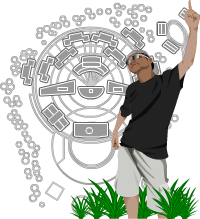CHANGE OF PERSPECTIVES – Ravivarma Rao Panirselvam, MBBS batch 13
6 weeks ago, I was naive in thinking that mental illnesses only strike a certain population. The very extremes I thought.
Well I was wrong.
Day in and out, 6 weeks in the Psychiatry and Mental Health ward and OPD in Hospital Sultan
Abdul Halim, Sungai Petani taught me that.
And I was also wrong in thinking that mental illness is a picture of an extremely dysfunctional human being.
Quoting a Psychiatrist, “For a given situation, the normal human brain responds in 10 different ways.”
People from all walks life can be affected. Just because they been through so much, lost too much, hurt so much and at times loved too much. To each his own!
The thing about mental illnesses is that they are real and as dangerous to the point as life- threatening as any respiratory distress or myocardial infarction.
Just because a patient with schizophrenia gives you an inconsistent history, doesn’t make him any less of a patient. A patient with congestive cardiac failure can’t run a 200 m dash because his
heart is not able to sustain that kind of cardiac output. In this context, his mind cannot sustain that
coherence of thought because his mind itself is confused and racing with thoughts that he himself cannot recognize whether they are his own or not! The fact that he can’t keep his story straight means that he is trying to tell you something is wrong with him.
Similarly while it is funny to see someone wash their hands a 100 times, the thought of being contaminated until to the point you want to cut your hands off is what a patient with OCD undergoes.
The derogatory thought of rotting flesh is what a person suffering from depression with psychosis feels,
The fear of dying that a person with social phobia experiences when he walks onto stage, The instability of a day for a person with bipolar affective disorder,
And we can continue listing a whole lot more.
Just because we can’t image nor synthesize the pathology through a biochemical or histopathological analysis, doesn’t mean it is not there. Medical science has not evolved to the point of quantifying thoughts and emotions. The same was 50 years ago on our understanding on genetic diseases but now look how much we achieved on that front. The human experience and distress is the evidence here for now. Besides, we approach a person clinically not just by laboratory results. We need to open our minds to reach there and we are already making headway by newer imaging modalities.
And the real deal is that mental illness is treatable.
However not just by a pill to be swallowed once a day for 5 days or by a surgery. The amazing
job mental health professionals do is never to be under-estimated. It is medicine in a higher sense:
To see the person as a whole and not just a set of symptoms,
Where the management is to integrate a person back into life and society,
Involving an entire gamut of treating the biology of the disease and the psychosocial aspects, Where everyone who can be possibly be involved are brought into the mix,
Where to treat is to heal.
It is a challenge and they do it. And it’s a thankless job.
Especially in a society which labels people as “mad and dangerous”, “mental doctor” and
“unstable.”
Where if a person breaks down, we call him weak and less resilient, Where anxiety is a reason to shun a person and laugh over coffee, Where we are not encouraged to discuss how we feel,
Where sometimes happiness is illegal,
Where we do not allow him to get better despite his own effort.
We talk about lot of things far too disconnected from ourselves and even rally for them without true understanding, without caring about the real issues that affect us as a person.
We shed tears for abstraction but not for reality?
We talk about equality while treating patients as jokes.
This is the paradox we live in. An immature society that is incapable on thinking on the real issues and problems that exist.
I close in a hope for a better tomorrow.
A day where patients with mental illnesses
are treated as any other illness with the empathy and dignity,
are offered help,
are allowed jobs without suspicion,
are allowed to feel as any other living person.
To that day we have to work.
[Ravi frequently contributes letters to editor of the Star newspaper, Ravi’s ‘Waffle we fail to see’ was published in the Asian Student Medical Journal 2011, 5:5.]
Source: AIMST University Faculty of Medicine Newsletter Volume 3 (March 2011 – Dec 2011)

